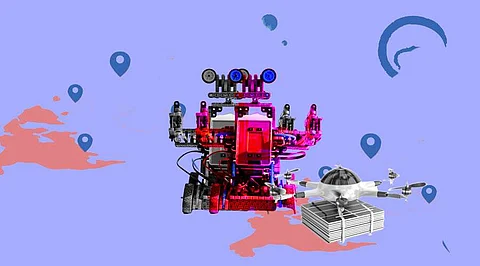

In the realm of supply chain management, innovation is the cornerstone of progress. With technology advancing at an unprecedented pace, supply chains are undergoing a profound transformation, and the spotlight is now on mobile robots as a potential game-changer. According to a recent report from Gartner, renowned for its insights into technology trends, mobile robots are poised to outshine drones in shaping the future of supply chain operations. This shift is driven by their adaptability, versatility, and capacity to address a myriad of logistical challenges.
Mobile robots, equipped with a blend of sensors, AI capabilities, and actuators, have rapidly gained traction in diverse industries such as manufacturing, e-commerce, healthcare, and agriculture. Unlike predominantly airborne drones, mobile robots traverse the ground, granting them a unique edge in navigating complex indoor environments like warehouses, factories, and distribution centres.
Gartner's report underscores the potential of mobile robots to outpace drones in supply chain applications, driven by their capacity to perform a spectrum of tasks with enhanced efficiency. While drones have showcased their prowess in certain last-mile delivery scenarios, they grapple with limitations including weather disruptions, airspace regulations, and payload constraints. In contrast, mobile robots exhibit prowess across various supply chain phases, spanning material handling, inventory management, order fulfilment, and transportation.
A pivotal advantage of mobile robots is their adaptability to diverse environments and tasks. These robots are programmable and configurable, rendering them versatile tools for an array of supply chain scenarios. For instance, equipped with picking arms, they can efficiently retrieve items from shelves. By integrating autonomous navigation systems, they seamlessly transport goods within warehouses. With advanced AI algorithms, they optimize route planning and inventory replenishment, fostering operational excellence.
The warehousing sector, a linchpin of modern supply chains, stands to reap substantial benefits from the integration of mobile robots. Gartner emphasizes that these robots can catalyze order processing, reduce manual labour, and elevate inventory precision. Collaborating harmoniously with human workers, mobile robots streamline task orchestration and curtail error risks. As the demand for expedited order fulfilment escalates, along with the pursuit of same-day deliveries, mobile robots rise as an effective remedy.
Beyond warehousing, the prowess of mobile robots manifests brilliantly in manufacturing environments. Gartner's insights illuminate how these robots optimize production lines by seamlessly ferrying materials, components, and finished products between different manufacturing stages. The result is accelerated production cycles, minimized downtime, and upheld quality control consistency.
Gartner's projection of mobile robots shaping supply chain dynamics is rife with potential, yet it's not devoid of challenges. Integrating into existing infrastructure, ensuring interoperability with other technologies, and addressing concerns regarding job displacement are among the hurdles that industries must confront. Nevertheless, technological advancements and astute planning hold the potential to surmount these challenges, paving the way for seamless integration.
The evolution of supply chains hinges upon embracing innovation and harnessing technology's transformative prowess. Gartner's prediction that mobile robots will surpass drones in shaping the future of supply chain operations is an illuminating testament to the versatility and potential of ground-based robotics.
Join our WhatsApp Channel to get the latest news, exclusives and videos on WhatsApp
_____________
Disclaimer: Analytics Insight does not provide financial advice or guidance. Also note that the cryptocurrencies mentioned/listed on the website could potentially be scams, i.e. designed to induce you to invest financial resources that may be lost forever and not be recoverable once investments are made. You are responsible for conducting your own research (DYOR) before making any investments. Read more here.
